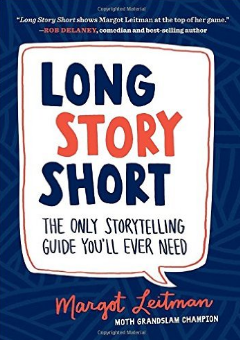 I recently read “Long Story Short: The Only Storytelling Guide You’ll Ever Need” by Margot Leitman. Below are the quotes I found most interesting. If you like the quotes, click here to buy the book.
I recently read “Long Story Short: The Only Storytelling Guide You’ll Ever Need” by Margot Leitman. Below are the quotes I found most interesting. If you like the quotes, click here to buy the book.
““Go where you are celebrated, not tolerated.” -Unknown” (xviii)
“When you’re telling a story, if we don’t know what you want – e.g., to meet your soulmate/make the team/start a family – we end up disinterested and not rooting for you.” (xxi)
““Most events in life can be categorized in one of two ways: a good time, or a good story.” -Unknown” (3)
“Find the recurring theme in your life, then look for the extremes.” (12)
“Some of the most successful artists out there have found one recurring theme and told variations of that story over and over, to great success.” (13)
“Storytelling isn’t about bashing someone else; it’s about being brave enough to share your story and make others feel better about their own lives. Let your audience leave feeling like, “Wow, he/she went through that and he/she is standing up there laughing about it? I’m not doing so bad!” (30)
““I have a theory that the truth is never told across a desk. Or during the nine-to-five hours.” -Hunter S. Thompson” (43)
“Instead of calling the three people in your story Lenny, Karl, and Pete (which is a lot for an audience to keep track of), try nicknaming them via interesting characteristics. It’s a lot easier for an audience to keep track of Dreadlocks, Afro, and Hemp Necklace rather than Lenny, Karl, and Pete.” (52)
“You have to trick people into caring about your life. You have to somehow make them think that your life is just like theirs. Once you do that, they will listen to anything you have to say. You can’t make your listeners feel like they’re excluded from your story. They must feel like they’re a part of it. One way to do this immediately is to identify the setting.” (60)
“By showing your audience where your story takes place, you immediately invite them into your world, whether they have a shared experience there or it’s a place they’ve always wondered about.” (60)
“Chances are, if you respond well to something, it’s because you relate to the person. If you don’t respond well, it’s because you feel like you aren’t included.” (62)
“The point of entry” is the point where your story somehow pertains specifically to someone else’s life. This is different for every person in the audience. The point of entry is where our attention is really piqued; it’s what should keep us engaged throughout.” (66)
“Since everyone’s point of entry is different, a good story has many points of entry.” (67)
“We are all selfish. Unless your story is also our story, we won’t give it a chance.” (68)
“Indifference is the enemy of storytelling. If you don’t feel strongly about what you are talking about, the audience won’t care about it either.” (86)
““In general, don’t portray anything that says “I’m too cool and I don’t care.” -Paul Feig” (87)
“As listeners, we often care more about how you felt about what happened than what actually happened.” (89)
“Feeling strongly towards or against something/someone can make your story soar.” (91)
“No one likes being told how to feel. We feel things organically, or we don’t.” (95)
“What’s important is that your story moves us in some way. Don’t get caught up in making sure we see your point.” (106)
“We can apply this same principle to storytelling. Your point, or moral, or deeper message, should be known to you, to drive the writing and telling of your tale, but in my opinion, you should keep it to yourself.” (108)
“It’s not crucial that your audience gets your point, just that they get a point.” (111)
“We relate to people who reveal themselves as genuine, warts and all. Therefore, you should strive to be your most genuine self when telling a tale.” (144)
“What makes your story a story that only you can tell is how clearly you define yourself as a character.” (147)
“What you were wearing shows us what type of person you were at the time.” (149)
“”The more specific you are, the more relatable you are.” -Janeane Garofalo” (151)
“”Conceal a flaw, and the world will imagine the worst.” -Marcus Valerius Martialis” (167)
“If you present yourself as flawless, we won’t be on board with you at the top of your piece, and there is often no turning back.” (167)
“Joel Jones wasn’t seeking audience approval; he was sharing his truth.” (204)
“Many business decisions are made simply because a decision maker liked one person over the other.” (259)
“”Having a show get canceled is like, “Oh you have caviar between your teeth,” you know what I mean? Because you had a show in the first place.” -Jonathan Ames” (274)
“Shouldn’t I be having fun onstage even if there is no prize at the end of it?” (277)
Liked the quotes? Buy the book here.

